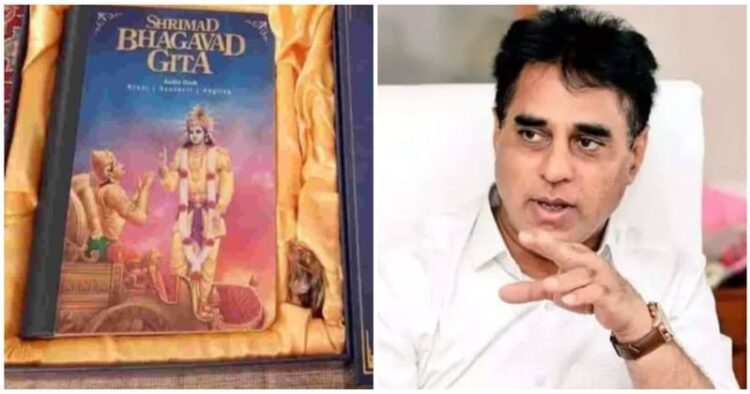In a significant move aimed at integrating Indian culture and values into the education system, the Gujarat legislative assembly has unanimously passed a resolution to include teachings from the revered Hindu scripture, the Bhagavad Gita, in the school curriculum. The resolution, introduced by Minister of State for Education Praful Pansheriya, garnered support from across the political spectrum, with the Aam Aadmi Party (AAP) and the Congress party eventually lending their backing after initial protests.
The resolution comes on the heels of the State Education Department’s decision last December to incorporate principles and values from the Srimad Bhagavad Gita into the syllabus for students from Class 6 to 12. According to Minister Pansheriya, this move is in line with the objectives outlined in the National Education Policy 2020, which emphasises fostering a sense of pride and connection to India’s rich cultural heritage among students.
Addressing the assembly, Minister Pansheriya stressed the importance of integrating Indian culture into students’ daily lives to facilitate their holistic development. He highlighted the universal appeal of the Bhagavad Gita, stating that its teachings have influenced not only Indian thinkers and saints but also modern and Western intellectuals. The minister underscored the need to introduce these values in a manner that captures students’ interest and understanding.
The implementation plan outlined by Minister Pansheriya includes incorporating the teachings of the Bhagavad Gita into various subjects across different grade levels. For students in Classes 6 to 8, the scripture will be introduced through stories and recitations in the Sarvangi Shikshan subject, which covers music, painting, and physical education. From Classes 9 to 12, the teachings will be integrated into the first language textbooks as stories and recitations.
While the resolution received unanimous support in the assembly, it was not without criticism from the opposition. Congress MLA Kirit Patel raised concerns about the government’s priorities, citing issues such as the student-teacher ratio and dropout rates in the state. He accused the ruling BJP of using the resolution as a smokescreen to divert attention from these pressing issues.
Echoing similar sentiments, Leader of the Congress legislative party, Amit Chavda, criticised the resolution as a publicity stunt. He argued that the government should have presented the resolution prior to deciding on the curriculum change, questioning the efficacy of urging the Government to implement its own decision properly.
In contrast, AAP MLA Umesh Makwana expressed full support for the resolution, urging the government to ensure the effective implementation of the curriculum change. He emphasised the need to appoint Sanskrit teachers and suggested incorporating teachings from the Hindu epic, Ramayana, into higher classes.
The unanimous passage of the resolution marks a significant milestone in Gujarat’s education system, signalling a concerted effort to imbue students with the values enshrined in ancient Indian scriptures. As the state moves forward with its implementation, all eyes will be on ensuring that this initiative translates into tangible benefits for students across Gujarat.




















Comments